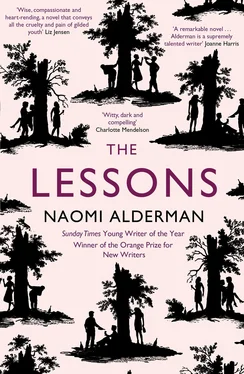I put my hands on her shoulders, where she liked me to massage her. She stood up.
‘I’m sorry but I can’t … I can’t do this with you right now.’
‘But … it was an accident.’
‘I’m sorry, James, I just can’t. Not now.’
Even once the brace had come off and she was practising again, she did not return to our bedroom. Sometimes I watched her practising in the conservatory from the side of the house, my view half-obscured by the Virginia creeper. Several times, Randolph came to help her practise and his arm around her waist and his swaying hips next to hers forced me to walk through the conservatory absent-mindedly, as if I’d forgotten a book.
‘For God’s sake, James,’ she said, ‘I wish you’d stop lurking here with that hangdog expression,’ and Randolph laughed, a low rumbling chuckle.
After five or six days of this, I cornered her in the kitchen and spoke without preamble the question which was at the very top of my thoughts: ‘Have we broken up?’
She was carrying a jar of jam, a packet of croissants, a plate, a knife, all in her left hand.
‘Um,’ she said, ‘do you want to break up?’
‘No. No. I don’t I … I love you.’
‘Then we haven’t broken up.’
‘But what … why are you still sleeping upstairs?’
‘I just need a bit of time, James. Just a little time.’
‘How long?’
She exhaled sharply through her nose, a bull-snort of impatience.
‘I can’t tell you how long. But you’ll make it longer if you keep badgering me.’
I stared at her, speechless.
‘Look,’ her voice softened, ‘we will talk about it, OK? But I’ve lost a lot of time. I can’t make time for all this now. That’s your problem, James. You need something other than me to think about. Just … do something else. Take your mind off it.’
She stepped around me and back to the conservatory.
The next morning I stood in the hall, sorting the post. It had become a comforting ritual, now that Jess and I no longer had tea in bed together each morning. There was a letter from my parents — I recognized my mother’s handwriting — one for Jess from her sister, several each for Franny — she had schoolfriends at different universities who wrote to each other ceaselessly — and for Emmanuella, in the distinct ive continental handwriting. And for Mark, a parcel from California — these came at least weekly and had contained everything from a jar of cactus jam to a long fur coat — and a letter from Dorset. I didn’t notice him standing on the stairs above me until he snatched the letter out of my hands.
I looked at him quizzically. He frowned, raising an eyebrow and said, ‘It’s from Nicola. You remember, Simon’s sister. She writes to me sometimes.’
I laughed. ‘What, mad Christian Nicola?’
‘I wish you wouldn’t say “mad” and “Christian” as if they went together.’
‘Fine. I meant to say, “What, Nicola with the massive boobs?” ’ He beamed and said, ‘Happily I wouldn’t notice such things. Our friendship is on a more spiritual level.’
‘You’re not going to show me, then?’
‘Certainly not. Letters are private. What about yours, anyway?’
‘Oh,’ I said, ‘it’ll just be my mother’s usual letter: a list of all the things Anne’s done, how proud she’s made them, how happy they are to have her as a daughter and what a disappointment I am by comparison.’
I crumpled the letter up and thrust it into my pocket.
I only came to read it just before bed, after yet another evening spent fruitlessly trying to understand my latest question sheet and — equally fruitlessly — to avoid watching Jess practise. And when I looked it was not the usual screed at all.
The letter was in my mother’s rounded handwriting:
Dear James,
Daddy and I are very unhappy about your credit card bill. £270 in a bar! It’s too much, James. Anne thinks, and we agree, that paying this bill will just encourage you to do it again. You need to learn to be responsible with your money. We don’t want you to waste the opportunity of Oxford, especially after your results.
So, we’ve decided we won’t be paying any more of your bills from now on. Daddy has changed the address so the bills will come to Annulet House. We hope this will help you to concentrate on your studies and not your social life.
Love
Mummy
At the bottom, my father had added a postscript:
Learn to live according to your means. It’ll serve you well in life. Dad
This was something of a blow. It was probably true that my charges to that card had grown in the past year. In my first term I had purchased only the absolutely required texts, and those I had sought out in the second-hand department at Blackwell’s. But then in my first term I’d been almost suicidally depressed, had had no friends, had not wanted to go anywhere or do anything. Since then, although Mark had provided most necessities, we’d had dinners out at pleasant Oxford restaurants and evening trips to the London theatre, and I’d thought that, after all his generosity, it was only fair for me to buy the odd bottle of wine to contribute. I felt rather angry with my parents. The cost of purchasing that happiness seemed so ridiculously small that I could not believe they wouldn’t see it my way if I phoned the next day and spoke to them directly.
They did not see it my way. I talked first with my mother, who, in pleading tones, asked me not to upset my father. ‘He was very angry when he saw that bill,’ she said, ‘very very angry.’ My heart quailed somewhat at this news. ‘You must remember,’ and there was iron in her voice, and I knew to whom she had been speaking, ‘that we never had to pay Anne’s way like this.’
‘Maybe Anne didn’t have so many expenses?’ I chanced.
‘Maybe she didn’t associate with such high-living friends,’ my mother said peevishly.
I heard my father rumble in the background, ‘Is that James on the phone? Tell him I’d like a word with him, if you’d be so good.’
‘Your father wants to speak to you.’
I felt tears starting in my eyes. Actual hot, aching, terrified tears, as if I were a young child again and had been caught scribbling on the living-room curtains.
‘Fine,’ I yelped, ‘fine. I don’t know what else he can say though.’
There was a clattering as the phone changed hands.
‘James, it’s your father. Your mother and I are very unhappy with you. We’re not prepared to continue to underwrite this frivolous lifestyle. This house nonsense,’ he harrumphed, ‘it’s no good for you. Look what’s happened to your work.’
There was a pause. I imagined the way that he would be turning to my mother and she would be nodding and giving him encouragement.
‘We’d like you to move back into college,’ he said, ‘but until then we can’t keep paying these bills.’
‘What? Any of my bills?’
In the background, my mother said, ‘How many bills does he have?’ She must have had her ear pressed to the back of the receiver.
‘Yes,’ said my father, ‘how many bills do you have, James? You’re living in that house rent-free, your tuition is free, the libraries are free. So, you need a bit for books and a bit for food. We’ll give you … £50 a month, all right?’
‘A month! No, £50 is not all right! Not all right! That’s nothing …’
‘If we see your results improve, we’ll think again. It’s for your own good, James.’
‘But I …’
‘That’s our final decision, James.’
‘But …’
‘We’ll talk to you soon, darling.’ This was my mother again. ‘Work hard. You’ll thank us for this later, dear.’
Читать дальше












